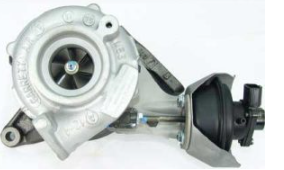In commercial fleets, reliability and efficiency are critical. Trucks, buses, and delivery vans cover thousands of miles, often under heavy load conditions, making engine performance and fuel efficiency paramount. Turbochargers play a central role in maintaining this performance by increasing engine power without requiring larger, heavier engines. Over time, however, even high-quality turbos experience wear, resulting in reduced efficiency, higher fuel consumption, and increased emissions. Turbo refurbishment offers a practical, cost-effective solution that restores performance, reduces downtime, and enhances the operational lifespan of fleet vehicles.
Why Turbo Efficiency Matters in Fleet Operations
Turbochargers compress air entering the engine, ensuring more oxygen is available for combustion. This increases power output, optimizes fuel use, and reduces exhaust emissions. For fleet operators, turbo efficiency directly impacts:
- Fuel costs – Even minor drops in turbo efficiency can significantly increase fuel consumption across a fleet.
- Vehicle reliability – A worn turbo can strain the engine, leading to mechanical issues and costly repairs.
- Environmental compliance – Efficient turbos reduce emissions, helping fleets meet regulatory standards.
Maintaining turbo performance is therefore not only an operational necessity but also an economic and environmental priority.
The Benefits of Turbo Refurbishment for Fleets
1. Reduced Downtime
Fleet vehicles are revenue-generating assets. Any downtime due to engine issues affects productivity. Refurbished turbos restore optimal performance, allowing vehicles to remain operational for longer periods and reducing service interruptions.
2. Cost Savings
Refurbishing existing turbos is generally more cost-effective than full replacements. By restoring efficiency, fleet operators save fuel and minimize the likelihood of expensive engine repairs caused by a failing turbo.
3. Enhanced Fuel Efficiency
Refurbished turbos ensure engines maintain peak combustion efficiency. Across a fleet, even small improvements in fuel efficiency translate into substantial cost reductions and lower environmental impact.
4. Extended Engine Life
A properly functioning turbo reduces strain on pistons, cylinders, and exhaust components. By restoring turbo performance, refurbishment indirectly extends the operational lifespan of engines, delaying major overhauls.
5. Environmental Responsibility
Fleet operations contribute significantly to emissions. Refurbished turbos improve fuel efficiency and reduce exhaust pollutants, supporting greener fleet management practices.
Recognizing Turbo Wear in Fleet Vehicles
High-mileage fleet vehicles are particularly susceptible to turbo wear. Common signs include:
- Loss of engine power, especially under load
- Increased fuel consumption
- Excessive smoke from the exhaust, typically blue or black
- Unusual whining or whistling sounds
- Engine warning lights related to boost pressure
Early detection and timely refurbishment prevent minor issues from becoming major engine problems, reducing both downtime and environmental impact.
Technical Considerations in Fleet Turbo Refurbishment
Refurbishing fleet turbos requires precision and expertise due to the demanding conditions under which these engines operate. Key technical aspects include:
- Rotor balancing – Ensures smooth operation at high rotational speeds, critical for heavy-duty engines.
- Seal and bearing inspection – Maintains proper oil flow and prevents leaks under continuous operation.
- Variable geometry calibration – Modern fleet turbos with adjustable vanes require precise adjustment for optimal airflow.
- Electronic actuator verification – Confirms accurate communication with engine management systems.
Proper refurbishment extends turbo life, ensures reliability, and maintains performance under the heavy-duty demands of fleet operation.
Advantages Across Different Fleet Types
Delivery and Logistics Vehicles
For vans and delivery trucks, turbo efficiency directly impacts fuel costs and delivery schedules. Refurbished turbos help maintain consistent performance across daily routes.
Long-Haul Trucks
High-mileage trucks benefit from restored turbo efficiency, reducing engine strain and lowering maintenance costs over extended journeys.
Public Transport Buses
Buses operating in city and regional routes require consistent engine performance. Turbo refurbishment ensures smooth acceleration, efficient fuel use, and compliance with emission regulations.
Construction and Industrial Vehicles
Heavy machinery with turbocharged engines experiences intense operational loads. Refurbished turbos prolong component life and reduce the risk of unscheduled downtime.
Environmental Benefits for Fleet Operators
Fleet operations have a substantial environmental footprint. Turbo refurbishment contributes to sustainability by:
- Improving fuel efficiency, lowering greenhouse gas emissions
- Extending engine life, reducing the need for new vehicle production
- Reusing existing turbo components, minimizing industrial waste
Efficient, refurbished turbos help fleet operators meet both economic and environmental targets.
The Importance of Specialist Expertise
Fleet turbochargers operate under extreme conditions and require precise restoration. Incorrect handling can lead to reduced efficiency, higher emissions, and even engine failure. To ensure maximum benefits, it is vital to find a specialist near you who can professionally assess and refurbish turbos for fleet vehicles. Experts ensure that components are balanced, seals and bearings are in optimal condition, and the turbo operates safely under heavy-duty conditions.
Future Trends in Fleet Turbo Technology
As fleets adopt more advanced engines and hybrid technologies, turbo refurbishment will continue to evolve:
- Electric-assisted turbos – Enhance responsiveness while maintaining fuel efficiency in heavy-duty vehicles
- Advanced alloys and composites – Lighter, stronger materials extend turbo and engine lifespan
- Hybrid and alternative-fuel integration – Turbos designed for hybrid or low-emission systems optimize efficiency while reducing environmental impact
Refurbishment practices will adapt to these innovations, ensuring fleet operators continue to benefit from reliable, high-performance turbos.
Conclusion
Turbo refurbishment is a critical maintenance strategy for fleet vehicles. By restoring turbo performance, fleets benefit from reduced downtime, lower fuel costs, extended engine life, and improved environmental compliance. Refurbishment offers a cost-effective, sustainable solution that supports operational efficiency while contributing to greener practices.
Maintaining turbo efficiency ensures that fleet vehicles continue to perform reliably, economically, and responsibly, meeting both business objectives and environmental goals for years to come.
In commercial fleets, reliability and efficiency are critical. Trucks, buses, and delivery vans cover thousands of miles, often under heavy load conditions, making engine performance and fuel efficiency paramount. Turbochargers play a central role in maintaining this performance by increasing engine power without requiring larger, heavier engines. Over time, however, even high-quality turbos experience wear, resulting in reduced efficiency, higher fuel consumption, and increased emissions. Turbo refurbishment offers a practical, cost-effective solution that restores performance, reduces downtime, and enhances the operational lifespan of fleet vehicles.
Why Turbo Efficiency Matters in Fleet Operations
Turbochargers compress air entering the engine, ensuring more oxygen is available for combustion. This increases power output, optimizes fuel use, and reduces exhaust emissions. For fleet operators, turbo efficiency directly impacts:
- Fuel costs – Even minor drops in turbo efficiency can significantly increase fuel consumption across a fleet.
- Vehicle reliability – A worn turbo can strain the engine, leading to mechanical issues and costly repairs.
- Environmental compliance – Efficient turbos reduce emissions, helping fleets meet regulatory standards.
Maintaining turbo performance is therefore not only an operational necessity but also an economic and environmental priority.
The Benefits of Turbo Refurbishment for Fleets
1. Reduced Downtime
Fleet vehicles are revenue-generating assets. Any downtime due to engine issues affects productivity. Refurbished turbos restore optimal performance, allowing vehicles to remain operational for longer periods and reducing service interruptions.
2. Cost Savings
Refurbishing existing turbos is generally more cost-effective than full replacements. By restoring efficiency, fleet operators save fuel and minimize the likelihood of expensive engine repairs caused by a failing turbo.
3. Enhanced Fuel Efficiency
Refurbished turbos ensure engines maintain peak combustion efficiency. Across a fleet, even small improvements in fuel efficiency translate into substantial cost reductions and lower environmental impact.
4. Extended Engine Life
A properly functioning turbo reduces strain on pistons, cylinders, and exhaust components. By restoring turbo performance, refurbishment indirectly extends the operational lifespan of engines, delaying major overhauls.
5. Environmental Responsibility
Fleet operations contribute significantly to emissions. Refurbished turbos improve fuel efficiency and reduce exhaust pollutants, supporting greener fleet management practices.
Recognizing Turbo Wear in Fleet Vehicles
High-mileage fleet vehicles are particularly susceptible to turbo wear. Common signs include:
- Loss of engine power, especially under load
- Increased fuel consumption
- Excessive smoke from the exhaust, typically blue or black
- Unusual whining or whistling sounds
- Engine warning lights related to boost pressure
Early detection and timely refurbishment prevent minor issues from becoming major engine problems, reducing both downtime and environmental impact.
Technical Considerations in Fleet Turbo Refurbishment
Refurbishing fleet turbos requires precision and expertise due to the demanding conditions under which these engines operate. Key technical aspects include:
- Rotor balancing – Ensures smooth operation at high rotational speeds, critical for heavy-duty engines.
- Seal and bearing inspection – Maintains proper oil flow and prevents leaks under continuous operation.
- Variable geometry calibration – Modern fleet turbos with adjustable vanes require precise adjustment for optimal airflow.
- Electronic actuator verification – Confirms accurate communication with engine management systems.
Proper refurbishment extends turbo life, ensures reliability, and maintains performance under the heavy-duty demands of fleet operation.
Advantages Across Different Fleet Types
Delivery and Logistics Vehicles
For vans and delivery trucks, turbo efficiency directly impacts fuel costs and delivery schedules. Refurbished turbos help maintain consistent performance across daily routes.
Long-Haul Trucks
High-mileage trucks benefit from restored turbo efficiency, reducing engine strain and lowering maintenance costs over extended journeys.
Public Transport Buses
Buses operating in city and regional routes require consistent engine performance. Turbo refurbishment ensures smooth acceleration, efficient fuel use, and compliance with emission regulations.
Construction and Industrial Vehicles
Heavy machinery with turbocharged engines experiences intense operational loads. Refurbished turbos prolong component life and reduce the risk of unscheduled downtime.
Environmental Benefits for Fleet Operators
Fleet operations have a substantial environmental footprint. Turbo refurbishment contributes to sustainability by:
- Improving fuel efficiency, lowering greenhouse gas emissions
- Extending engine life, reducing the need for new vehicle production
- Reusing existing turbo components, minimizing industrial waste
Efficient, refurbished turbos help fleet operators meet both economic and environmental targets.
The Importance of Specialist Expertise
Fleet turbochargers operate under extreme conditions and require precise restoration. Incorrect handling can lead to reduced efficiency, higher emissions, and even engine failure. To ensure maximum benefits, it is vital to find a specialist near you who can professionally assess and refurbish turbos for fleet vehicles. Experts ensure that components are balanced, seals and bearings are in optimal condition, and the turbo operates safely under heavy-duty conditions.
Future Trends in Fleet Turbo Technology
As fleets adopt more advanced engines and hybrid technologies, turbo refurbishment will continue to evolve:
- Electric-assisted turbos – Enhance responsiveness while maintaining fuel efficiency in heavy-duty vehicles
- Advanced alloys and composites – Lighter, stronger materials extend turbo and engine lifespan
- Hybrid and alternative-fuel integration – Turbos designed for hybrid or low-emission systems optimize efficiency while reducing environmental impact
Refurbishment practices will adapt to these innovations, ensuring fleet operators continue to benefit from reliable, high-performance turbos.
Conclusion
Turbo refurbishment is a critical maintenance strategy for fleet vehicles. By restoring turbo performance, fleets benefit from reduced downtime, lower fuel costs, extended engine life, and improved environmental compliance. Refurbishment offers a cost-effective, sustainable solution that supports operational efficiency while contributing to greener practices.
Maintaining turbo efficiency ensures that fleet vehicles continue to perform reliably, economically, and responsibly, meeting both business objectives and environmental goals for years to come.


















